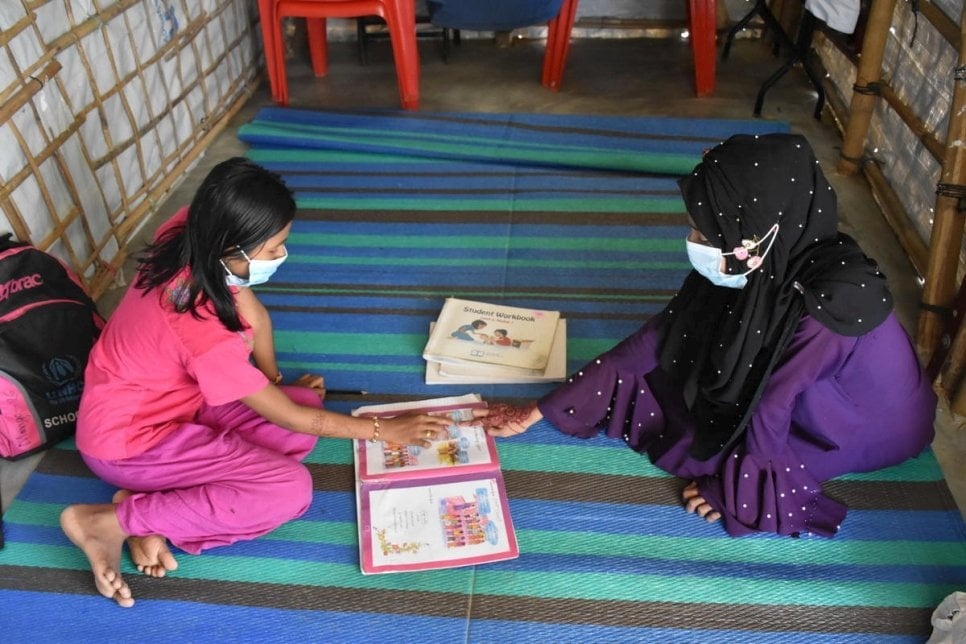‘We all miss home, but we cannot go back to the same fear’

‘We all miss home, but we cannot go back to the same fear’
By Nur Ayna in Kutupalong camp, Cox’s Bazar, Bangladesh | 21 August 2020
Following an outbreak of extreme violence in Myanmar’s western Rakhine state in August 2017, more than 740,000 Rohingya children, women and men sought safety in Bangladesh as refugees – among them 18-year-old Nur Ayna.
Today, Nur works as a Burmese language instructor at a learning centre in Kutupalong refugee camp, in Cox’s Bazar district. She reflects here on life in Myanmar – where the Rohingya are a stateless minority – her experiences as a refugee, and hopes for the future.
“In Myanmar, we had our lands where we grew flowers, vegetables and many plants. We had a big house where all the family members lived together. The violence and the killing drove us to leave our homes. They burnt houses in my neighbourhood. They shot and killed a lot of people in my village. We were living with fear every day. When we finally decided to leave, we had no other option.
It was the most difficult journey of my life. We walked for 13 days and nights. To cross the river, my family used a handmade bamboo raft. There were a lot of people with us – I couldn’t say what the number was, it was so huge.
Today in Bangladesh, we are three siblings living with our mother in the same house. My elder sister is married and lives with her in-laws in a different camp. I have some other relatives in the camps too, but we are no longer living like we used to in Myanmar. We are all scattered in different camps. But what more can we expect while we’re living in a refugee camp?

I miss my home and gardens a lot, but mostly I miss going to my school and studying. I didn’t have to work there – we had enough to afford a living. But here I have to work to support my family. I miss my old life in Myanmar.
Before the COVID-19 outbreak, I taught Rohingya children at the Mango Temporary Learning Centre in Kutupalong. We did not have much to teach them, but the children still enjoyed coming. They learned the alphabet, numeracy, Burmese poems and songs, and enjoyed the time with their friends. But the coronavirus pandemic has changed all of our lives.
Now we cannot go to the learning centres as the students cannot gather for classes anymore. So we are offering home classes as often as we can. We visit door to door to see our students and help them with their studies, so that they do not forget their lessons. It is not easy to check in on all the students at the same time. We miss doing our classes at the learning centres.
Here in the refugee camps, we are living on donations; we depend on them completely. We live in shelters made from tarpaulins and bamboo. It is always difficult to live here. But I think education is the biggest problem. We do not have quality education here: we only have basic education. It is not enough for anyone who wants a proper education and future.
I used to go to school in Myanmar, but we were not allowed to study further than high school. I only studied until the eighth grade at my school in Myanmar. We faced great discrimination. Some young boys and girls here in the camps also wish to have formal and higher education, but we have no country and no government to give us that.
I do not have children, I am not yet married, but I want formal education for our future generation. I hope someday we will have formal education for the Rohingya community. I have hope.
Since leaving Myanmar, our lives have changed completely. We do feel safe here, but we constantly think about our homes in Myanmar. I miss our home, our land, our garden and our everyday life in Myanmar. I wish to return home and get everything back. We all miss home, but we cannot go back to the same fear.
I want to go back in safety and as citizens of Myanmar. I still hope that this will be possible if the international community puts pressure on Myanmar.”
As told to Iffath Yeasmine




